You’ve been in the real estate game long enough to know where the gaps are: endless spreadsheets, missed updates, and timelines that only serve as suggestions. That’s why you’re no longer looking for real estate development software. You’re building it.
At Aloa, we work with entrepreneurs like you who are ready to solve industry-wide problems by developing their own real estate platforms. Whether it’s better financial oversight, Gantt-style construction timelines, or real-time document sharing across contractors, we help you bring that vision to life with custom software built to scale.
In this guide, we’ll walk you through the key decisions ahead: what types of software already exist, which features are worth investing in, and how to avoid common development pitfalls. You’ve spotted the opportunity. Now it’s time to build the solution.
Let’s dive in!
What Is Real Estate Tech?
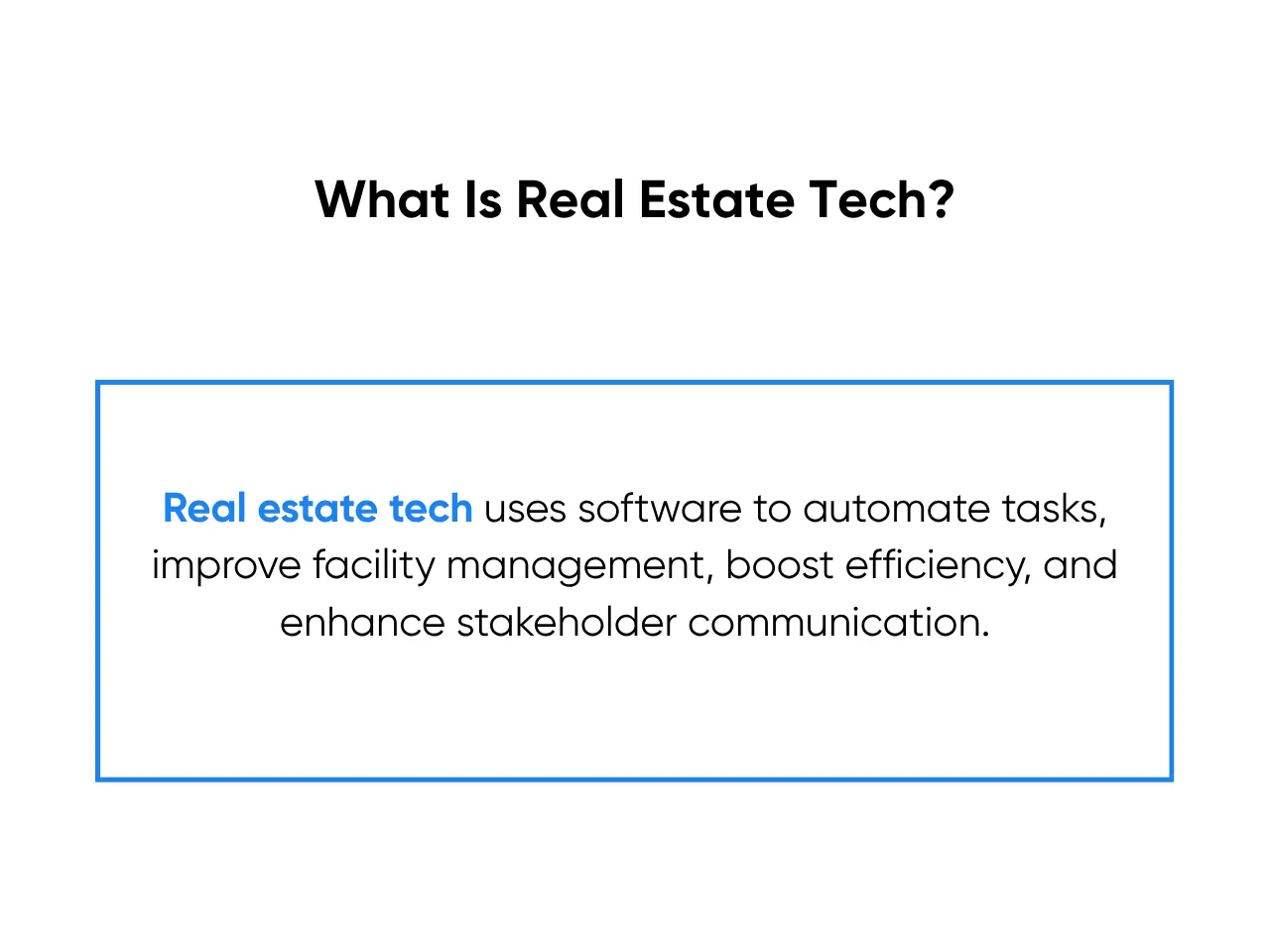
Real estate tech involves using technology to enhance operations in the industry. This includes real estate development software that automates tasks, improves facility management, and boosts efficiency while facilitating stakeholder communication. The main goal is to increase profitability by streamlining property management, sales, and resource allocation.
Types of Real Estate Software Solutions
Today’s market offers a variety of real estate development software solutions designed to meet the diverse needs of industry professionals. Let's explore the different types of software for real estate developers and how they benefit users across all levels.
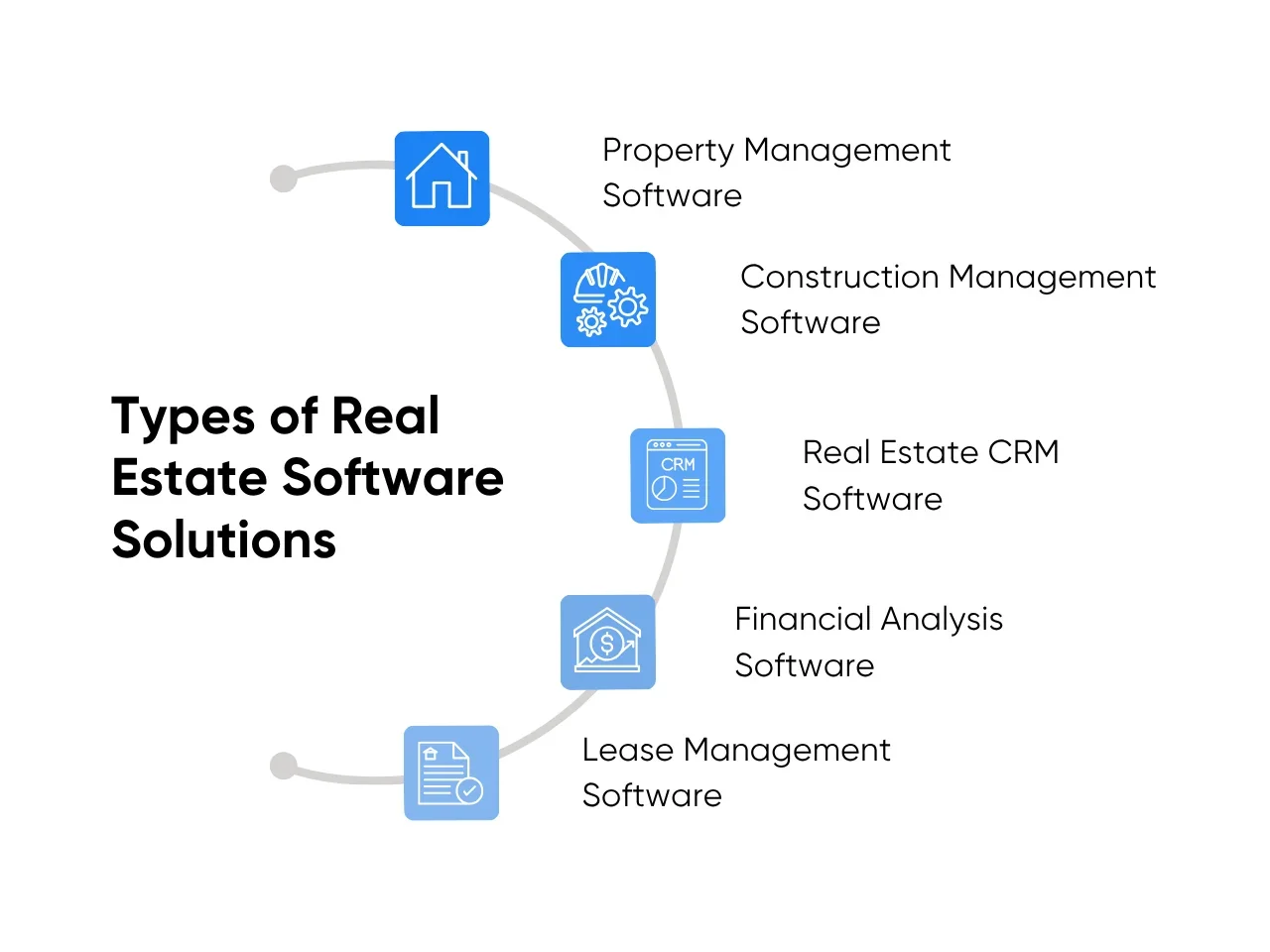
- Property Management Software: This real estate development software streamlines operations between property managers, landlords, and tenants. It offers rent payment tracking, maintenance request management, and lease document storage.
- Construction Management Software: This software helps real estate developers oversee property development project timelines and budgets. It includes features like task delegation, cost tracking, and document sharing.
- Real Estate CRM Software: This aids agents and brokers in managing client interactions and sales while providing easy access to necessary documentation. Key features of a real estate CRM include lead tracking, automated follow-ups, and property listing management.
- Financial Analysis Software: Tailored for investors, this real estate development software simplifies budgeting and profitability analysis while enhancing financial management. It provides tools for forecasting, cash flow tracking, and expense monitoring.
- Lease Management Software: This software helps project managers track and organize lease agreements. It automates renewals, tracks critical dates, and ensures legal compliance.
Building A+ Real Estate Tech Solutions
Creating top-notch real estate development software requires a clear understanding of the industry, best practices, and the latest technology trends. Here’s a concise guide outlining the key steps to take in building real estate tech software:
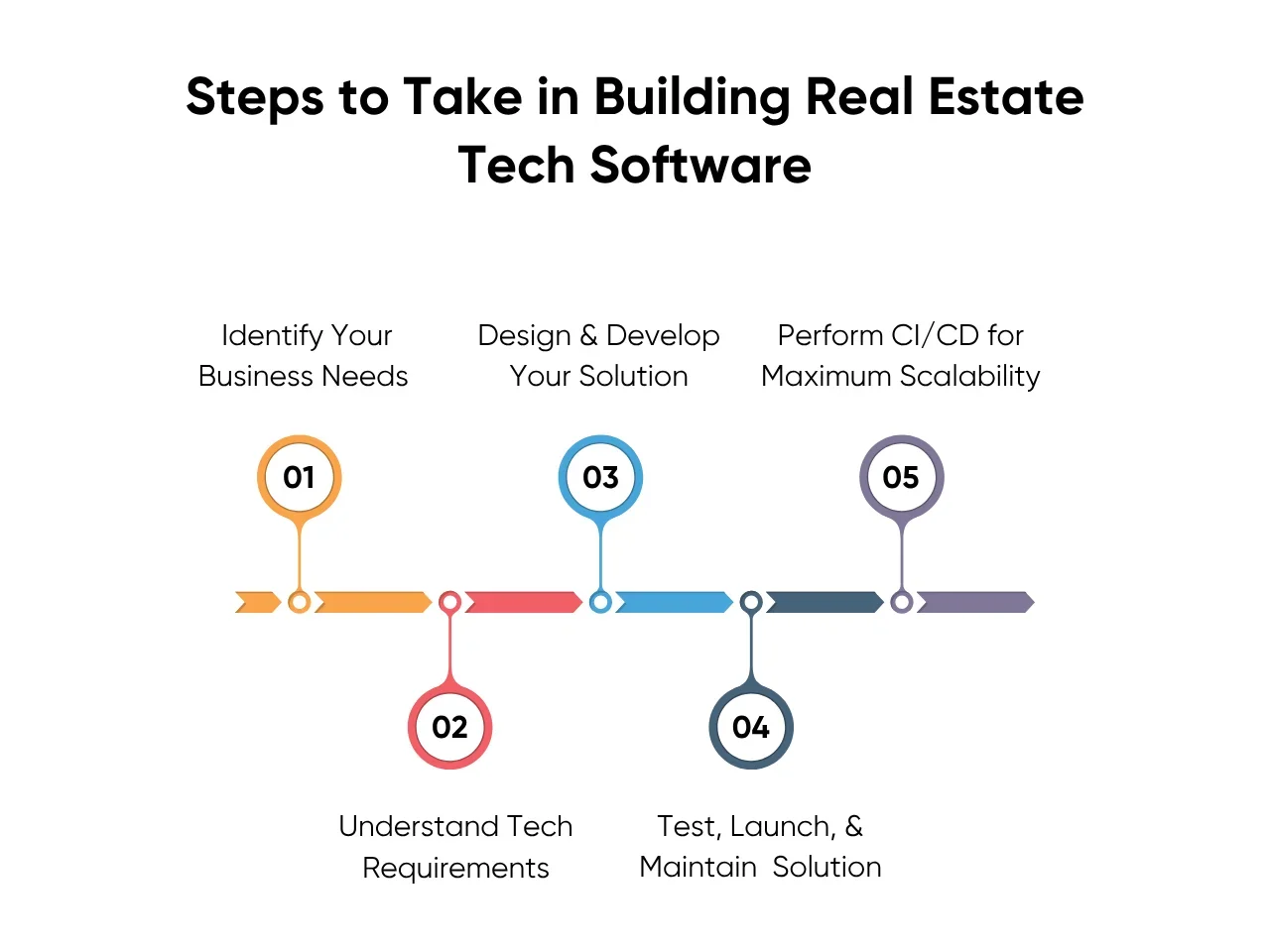
Step 1: Identify Your Business Needs
Before starting your real estate development software, take some time to identify the specific needs and challenges in your real estate business that technology can help solve. Knowing what you need will guide you in selecting the right features and functions for your software. This approach will make the development process smoother and ensure the final product meets your business goals.
Step 2: Understand Technology Requirements
Determine the technology requirements needed for your real estate development software. This includes selecting the suitable programming languages, frameworks, and tools that best support your objectives. Some commonly used tech stacks are:
- Web Development:React, Vue.js
- Mobile Development: Swift, Java, Kotlin
- Backend Development: PHP Laravel, Node.js, Python/Django
- Databases: MySQL, PostgreSQL
Step 3: Design and Develop Your Solution
After defining your business needs and technology requirements, design your real estate development software. Start by creating wireframe prototypes and visual outlines representing the layout and user interface flow.
Once satisfied with the wireframes, developers can start prototyping and building the software. This phase includes multiple rounds of testing and revisions to ensure user-friendliness and that the product meets your business needs.
Step 4: Test, Launch, and Maintain Your Solution
Conduct thorough testing before launching your real estate development software to ensure everything works correctly. This includes technical testing to fix bugs and user testing to confirm a positive user experience.
Testing on various devices and browsers is crucial for compatibility. Real users should test the software and provide feedback to identify any usability issues before you launch it.
Step 5: Perform CI/CD for Maximum Scalability
After launching your real estate development software, implement continuous integration and delivery (CI/CD) practices. This involves regularly updating the software based on user feedback and market needs.
Using CI/CD, your software can evolve with the industry, ensuring its long-term success. This practice also allows for easier scaling as your business grows and new features become necessary.
What Features Should a Real Estate Tech Solution Have?
Real estate development software can include various features based on the specific software you envision. However, regardless of the final product, these solutions should incorporate essential core features for both the admin and user sides. Top features to look for in real estate software should include the following:
Admin Side Features of Real Estate Tech
The admin side features of real estate tech focus on enabling developers, software managers, and staff to maintain the software effortlessly. These features include:
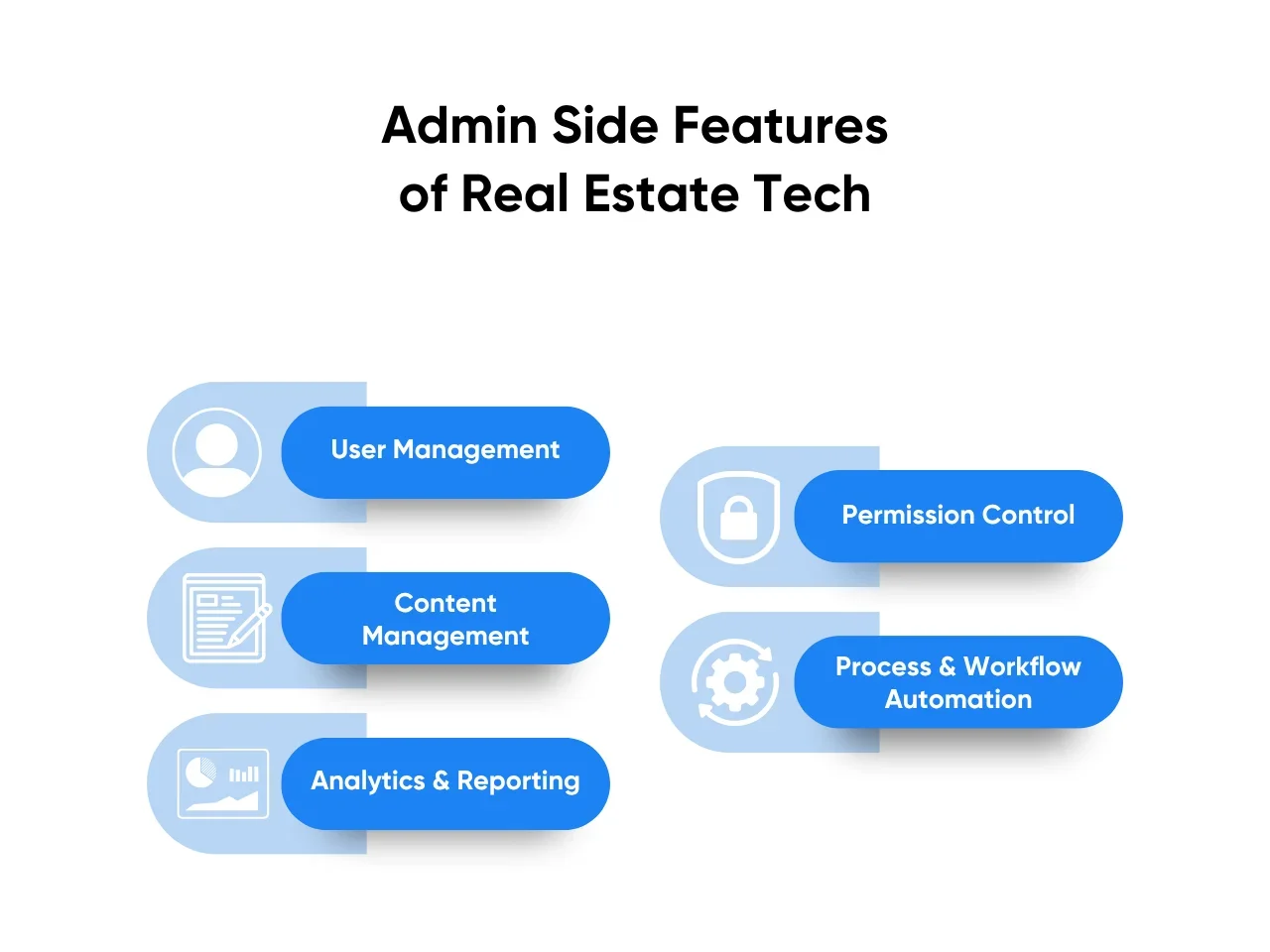
- User Management: This feature allows administrators to efficiently manage user accounts, including creating new users and deleting old ones. It also enables the assignment of specific roles and permissions to ensure everyone has the proper access.
- Content Management: With content management features, developers can easily add or update content within the software without coding skills while also planning for future developments and security features. This ensures that the information presented to users is always current and relevant.
- Analytics & Reporting: Analytics and reporting tools provide valuable insights into how the software is being used. They highlight trends and areas for improvement, helping administrators make informed decisions based on user behavior.
- Permission Control: Permission control features enable different access levels within the software, ensuring that sensitive information is secure and facilitating document management and version control. This helps maintain a controlled environment where only authorized personnel can access specific data.
- Process and Workflow Automation: This feature streamlines various tasks and processes, such as tracking project timelines, budgeting, or regulatory compliance, allowing administrators to automate routine activities. It enhances productivity and ensures tasks are completed efficiently without manual work intervention. Alongside these workflows, teams often use a real estate marketing checklist to ensure property launches, listings, and promotional activities follow a consistent, repeatable process.
User Side Features of Real Estate Tech
Real estate tech's front-end or user-facing features are designed for user interaction and visibility. These features aim to improve the overall user experience and offer essential tools, including:
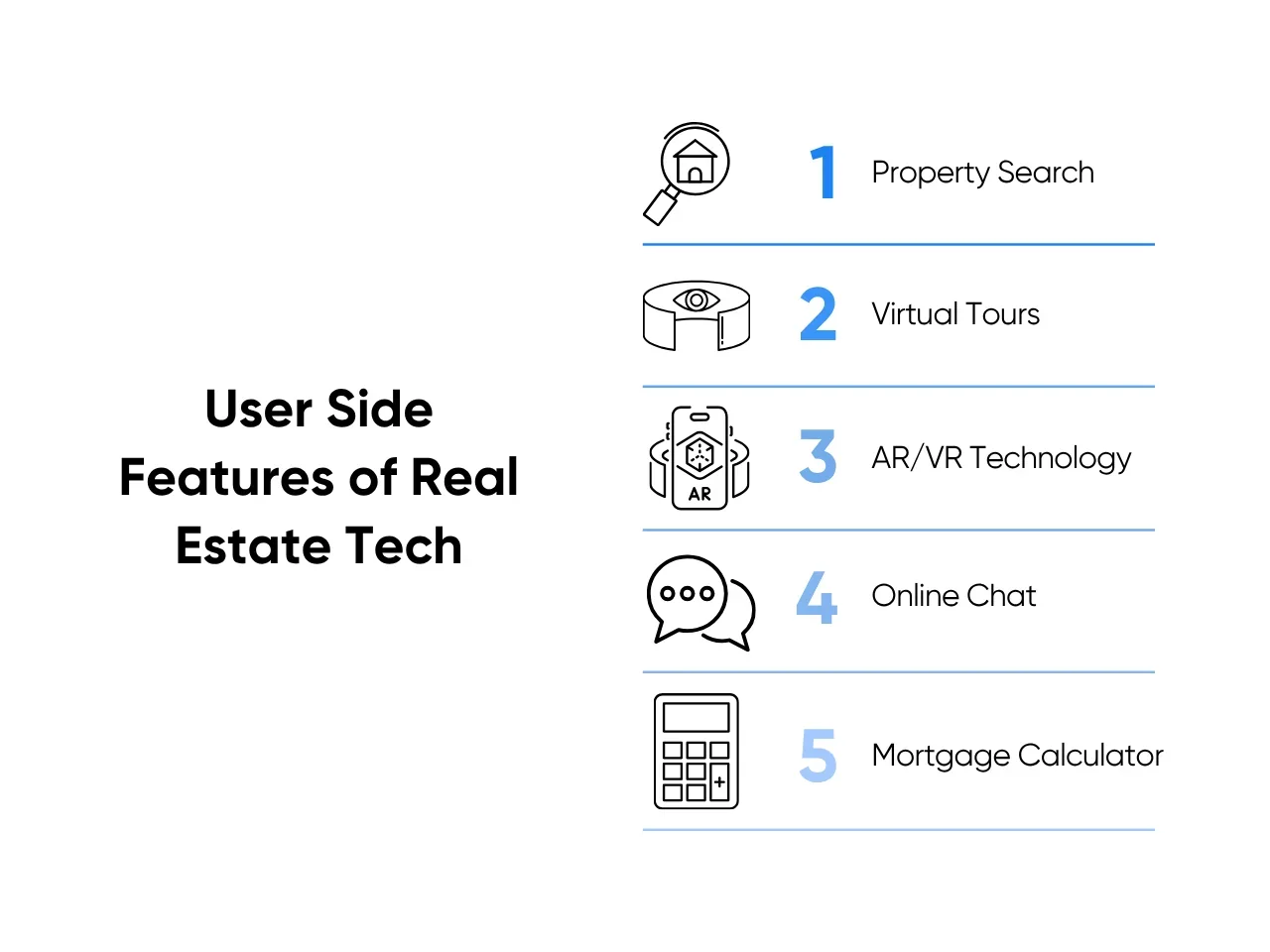
- Property Search: This feature allows users to easily search for properties based on location, price range, and other preferences. It also accommodates changes in orders and site selection, simplifying the property hunting process and helping users quickly find what they need.
- Virtual Tours: Incorporating virtual tours lets users experience a property through 360-degree views without being physically present. This feature is becoming increasingly popular, saving time and offering a comprehensive look at listings.
- AR/VR Technology:Augmented Reality (AR) and Virtual Reality (VR) enhance user engagement by providing interactive property showings. Users can explore listings more immersively, making the experience more enjoyable.
- Online Chat: An online chat feature improves communication between users and real estate agents. It allows users to ask questions and get immediate responses, enhancing customer service.
- Mortgage Calculator: This tool helps users estimate their potential mortgage payments for specific properties. It simplifies decision-making by allowing users to assess their affordability before making commitments.
6 Factors to Consider Before Purchasing Real Estate Development Software
While many real estate development software options exist, companies provide different levels of benefits. Understanding your company's goals in property management will clarify which factors are crucial for your business. Here are six key factors to consider before purchasing real estate development software:
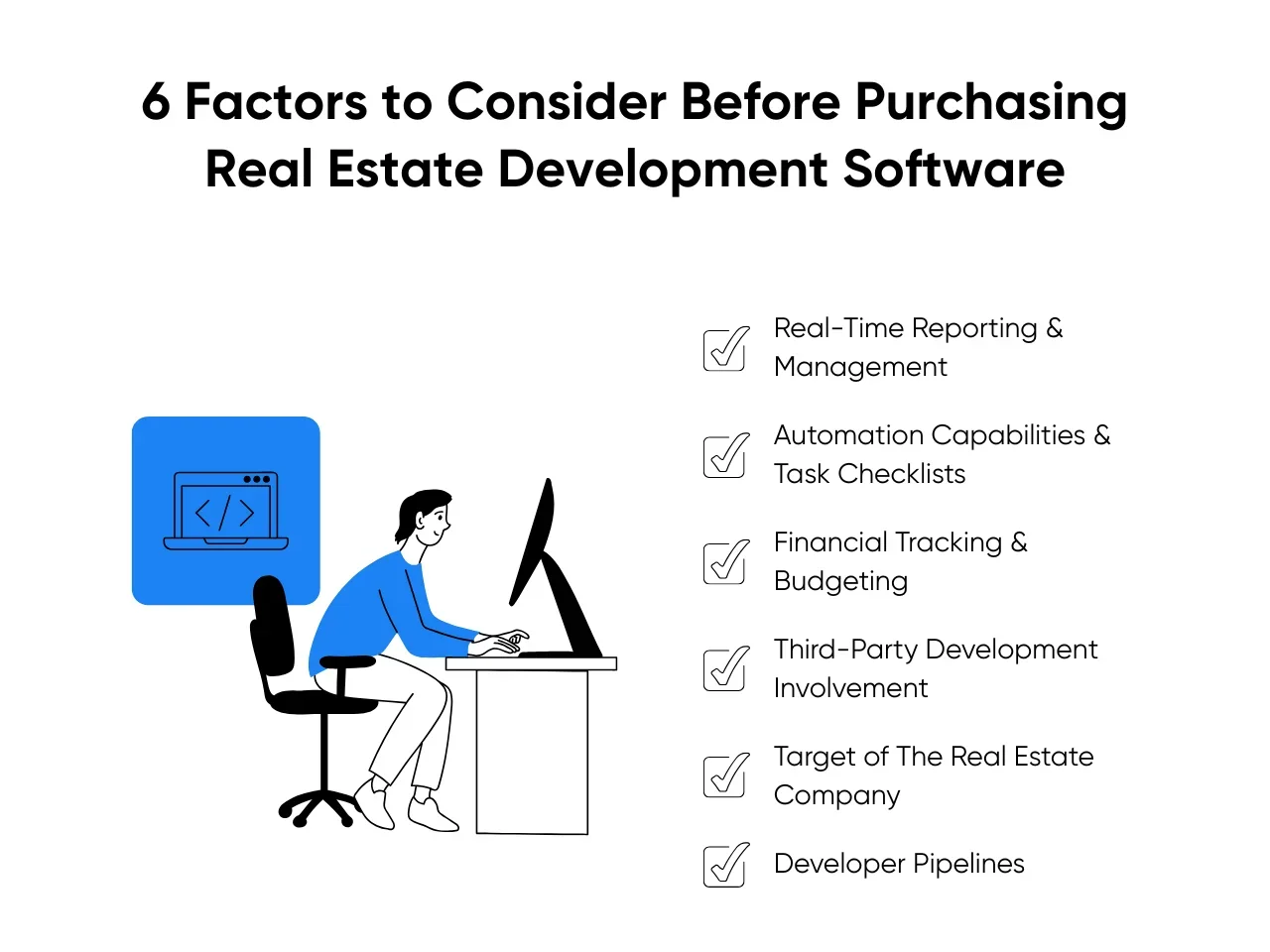
1. Real-Time Reporting and Management
Effective real estate development software should provide immediate responses, pricing plans, and detailed information. Companies in this industry often view market changes as chances to act quickly on sales once they have the necessary updates to make informed decisions.
Real-time reporting also helps construction and repair-focused companies. When general contractors, partners, or subcontractor firms finish a task, they can send updates via email immediately, informing everyone and allowing for consistency in completing projects ahead of schedule.
2. Automation Capabilities and Task Checklists
Each property listing has unique features, but turning them into prime real estate involves many tasks. Real estate development software with automation capabilities helps businesses assign routine tasks to different team members, ensuring projects stay on track.
An automation checklist can help verify that every step is completed before moving forward. Separating repetitive tasks into a simple checklist improves collaboration between administrators and operations.
3. Financial Tracking and Budgeting
Managing resources for real estate properties requires careful planning and oversight. On top of that, keeping track of spending, pricing, and potential repair costs can be challenging for businesses. This is why proper budget financing for each property is crucial to spend it wisely. One way to ensure proper financing is by leveraging construction business credit cards to keep project-related costs separate and organized.
Many real estate development software solutions offer finance tracking and budgeting tools and apps to simplify this process. These systems account for all costs and overhead, predicting the required financial investment to meet the property owner's goals.
4. Third-Party Development Involvement
Not all real estate development software has the necessary business management tools. Working with other real estate software development companies and using external tools are common when managing properties. A software solution enhances team communication, including internal and third-party project management software.
For commercial projects like buying and selling, a comprehensive CRM for real estate or cloud-based data systems can help manage clients. In contrast, construction-focused businesses may use external tools to share ideas and project plans more effectively throughout the entire construction process.
5. Target of The Real Estate Company
Identify your real estate business’s focus to help narrow down software options that align with your goals, whether it involves constructing properties or buying/selling existing ones.
Investors often prioritize the final results over the construction details. Some real estate development software uses artificial intelligence or machine learning to quickly identify industry trends. Explore how property management software can leverage these technologies to meet your company’s objectives.
6. Developer Pipelines
Administrative work is another side of the coin for businesses in the real estate industry. Consistent and accurate reports must be shared with investors, clients, buyers, and sellers in real estate management. While highlighting a property's features can help sell it, managing developer pipelines is essential for successful long-term investments.
These pipelines convert various report elements into valuable data for those who need it. Compiling this information becomes straightforward if clients need financial reports or yearly projections. Admins can also provide quick access to these documents, fostering customer trust and communication.
Key Takeaway
Real estate development software enhances project management and improves collaboration. By understanding the types of software, key features, and relevant factors, you can select solutions that align with your business goals. The right software can enhance project management, communication, and overall success in real estate endeavors.
As technology evolves, staying informed about the latest trends will help you remain competitive. Embrace real estate development software's opportunities to streamline processes and elevate projects.
Still deciding on the best real estate development software solution for your business? Aloa specializes in creating tailored solutions that meet your specific needs in real estate development. Let us help you streamline your processes and enhance your project management—reach out today!
Frequently Asked Question
What training and onboarding resources are available to help teams get started with real estate development software?
Most software offers onboarding resources like tutorials and walkthroughs. You get access to training guides, videos, and live webinars. Some providers offer dedicated onboarding managers for support. These resources help teams learn features quickly. They reduce errors and shorten the adoption timeline.
Is the software cloud-based or on-premise, and what are the pros and cons?
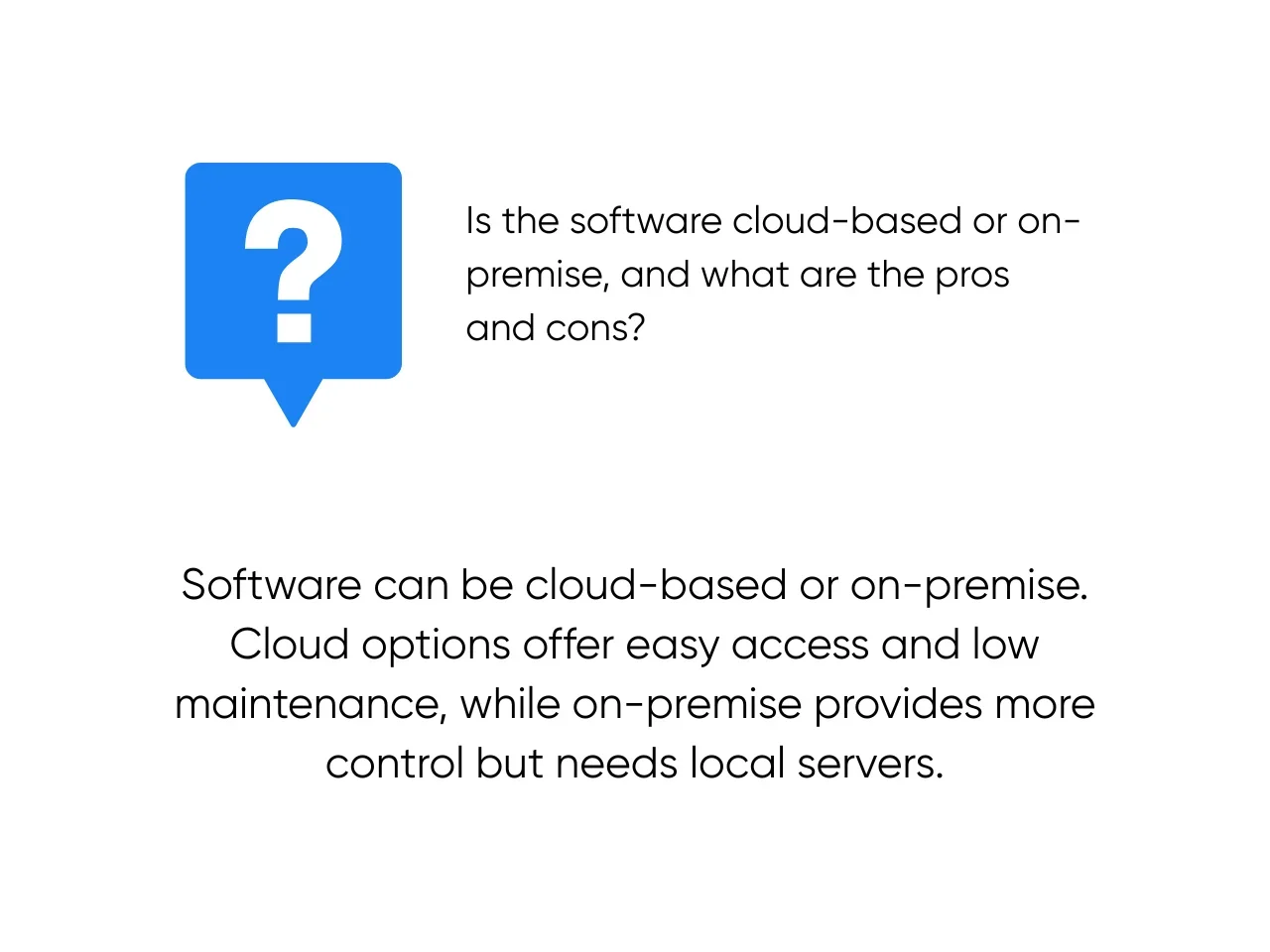
Yes, software can be cloud-based or on-premise. Cloud-based software is easy to access anywhere. It requires no local servers or maintenance. On-premise software runs on your own servers. It offers more control over data and security. Cloud options may require stable internet connections.
How does real estate development software handle data security and privacy?
Most software uses strong encryption for data security. Access is restricted by user roles and permissions. Regular security audits are standard practice. Providers comply with regulations like GDPR and CCPA. This protects sensitive project and client information.
Can I integrate real estate development software with other systems (like accounting, CRM, or project management tools)?
Yes, most platforms support integration with other tools. They offer APIs or built-in connectors for easy connection. Integration reduces manual data entry and errors. It helps teams keep information consistent and up-to-date. Always check which systems are compatible before you buy.
What types of support are available (e.g., live chat, phone, email) and during what hours?
Most providers offer support via live chat, phone, and email. Some offer 24/7 assistance, while others have business hours. Dedicated account managers may be available for enterprise users.
What is the pricing model or cost structure for common real estate development software solutions?
Most platforms use a per-user or per-project subscription model, often with tiered pricing based on access to features like reporting dashboards, scheduling tools, or investor portals. Some offer enterprise licenses for larger teams or multi-project use. Keep an eye on hidden costs: onboarding fees, API integrations, or added modules like permit tracking can add up fast. If you're building your own solution, this is exactly where you can outshine existing tools: by offering transparent pricing that scales with real-world development needs.

